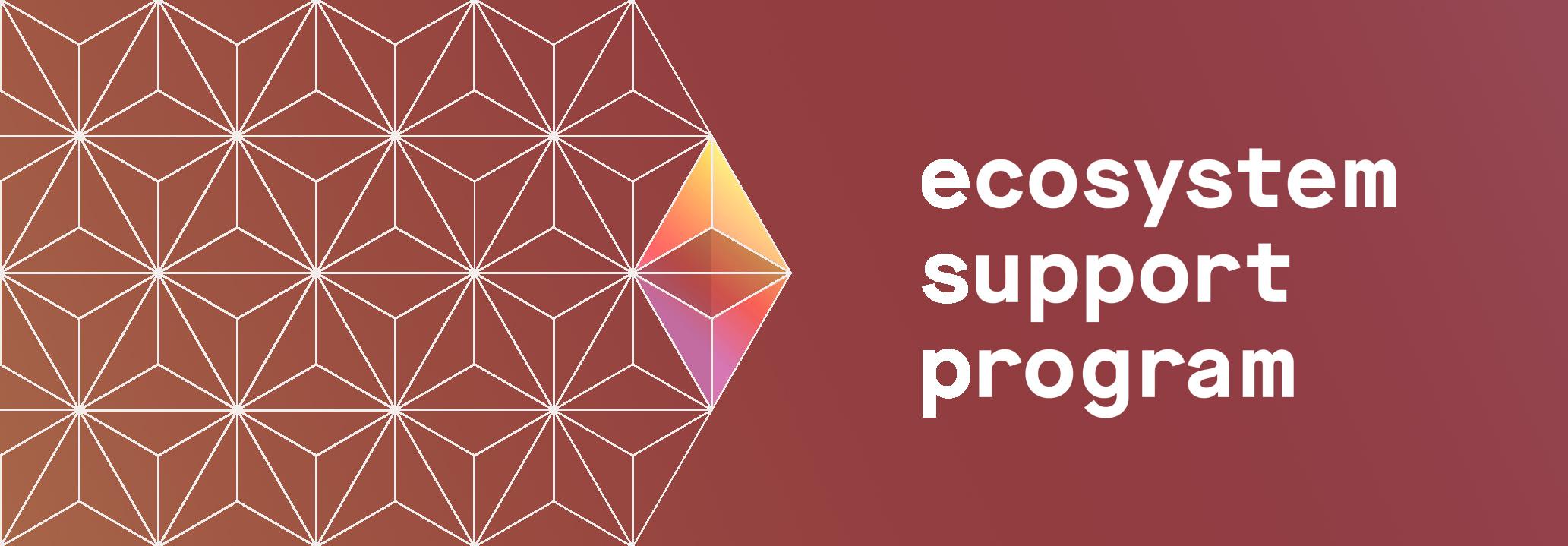It's quarterly update time again! The big news is is the Q3 grantees, of course, but we always like to share what else the ESP team has been up to. A few things we've knocked out lately:
- Added a Guide to ESP on our website. Here you'll find details on our mission, what we look for in the projects we support, types of support we provide, our process for accepting and evaluating grant proposals, and more.
- Published the first in a series of monthly roundups where we'll share progress on ongoing grants.
- Participated in events from meetups in Bangkok and Sao Paolo to virtual hackathons hosted by ETHGlobal, ETHPlanet, and Web3Bridge.
And of course, we got grants out to lots of excellent teams. Here's the list:
| Category | Grantee | Description |
|---|---|---|
| Community & education | BlockchainsForSchools | Sponsorship of BlockchainsForHacks, an ideation challenge for high school and college students to create innovative projects using blockchain technology. |
| Cryptography & zero knowledge proofs | Hubble | Continued funding for work on an optimistic rollup hub allowing creation of any rollup chain simply by writing a solidity function. |
| Cryptography & zero knowledge proofs | Zkopru (zk-optimistic-rollup) | Layer-2 scaling solution for private transactions using zk-SNARKs and optimistic rollup. Github: https://github.com/zkopru-network/zkopru |
| Cryptography & zero knowledge proofs | Dark Forest | Game theorietic research completed by a group of Stanford students on using zk-SNARKs to construct “incomplete information” environments where users can keep a private state while publicly submitting verifiably valid actions. Dark Forest was created to demonstrate the capability of this framework to create complex environmental and strategic dynamics in decentralized gaming. |
| Cryptography & zero knowledge proofs | Semaphore RLN | Method for preventing spam when using Semaphore, a zero-knowledge gadget for anonymous proof of membership. RLN (Rate Limiting Nullifier)reveals the private key of an account signaling above an acceptable rate, which another member can use to remove them from the group. |
| Cryptography & zero knowledge proofs | ETH Summer | Program for students to learn about and build on Ethereum, including contributions to 4byte.directory. |
| Cryptography & zero knowledge proofs | Aztec | Continued work on PLONK, including delivery of Ultra-PLONK, which adds PLOOKUP gates; development of a domain-specific language and compiler; and prover upgrades. |
| Cryptography & zero knowledge proofs | Blind Find v1 | Peer-to-peer network allowing private peer search: one user can locate another via provable pathways between multiple peers without revealing any information about the connection. |
| Cryptography & zero knowledge proofs | Quadratic Dollar Homepage | Smart contracts and web UI for a Quadratic Dollar Homepage, inspired by the Million Dollar Homepage. Users determine the prominence of images on a web page via quadratic voting, using Minimal Anti-Collusion Infrastructure (MACI) for collusion resistance. |
| Developer experience & tooling | Hardhat | Improvements to Hardhat (formerly known as Buildler), a development environment for compiling, deploying, testing, and debugging Ethereum software, built and maintained by Nomic Labs. |
| Developer experience & tooling | formalize.eth | Verified compiler from a subset of Vyper to YUL, written in Coq. |
| Developer experience & tooling | IPLD, Object Signing and Encryption | Joint funded with Protocol Labs: research by Textile and 3box into cryptographically securing data in IPLD, the linked data framework used by IPFS, to enable scalable and interactive dapps using both IPFS and Ethereum. |
| Ethereum 1.x | Web3 Labs | Continued maintenance and improvements to the Web3j library including Solidity library dependency management, smart contract migration support, Web3j Solidity debugger enhancements amd integration for IntelliJ/Android Studio, and Eth2 support. |
| Ethereum 1.x | Whiteblock | Testnet and experimentation to understand the impact, including uncle rates and block propagation times, of larger block sizes resulting from implementation of EIP-1559, reduction in calldata gas cost, and/or increase in gas limit. |
| Ethereum 1.x | OpenEthereum | Maintenance and development on OpenEthereum, a takeover of the Parity client spearheaded by Gnosis. |
| Ethereum 1.x | Imapp | Testing, including creation and deployment of a set of sample programs on various machines, operating systems and EVMs, to estimate gas costs and dependencies for EVM computation, with the goal of addressing imbalanced gas costs for EVM instructions. |
| Ethereum 2.0 | bitfly | Continued work on beaconcha.in, an open-source eth2 block explorer providing support for eth2 testnets. Github: https://github.com/gobitfly/eth2-beaconchain-explorer |
| Indirect funding | MetaCartel DAO | Contribution to a DAO funding microgrants and mentoring for post-hackathon and early stage teams. |
| Indirect funding | Gitcoin CLR | CLR matching for rounds 6-8. |
| Layer 2 | Burn Auction | Censorship-resistant block creation mechanism for Optimistic Rollups wherein the right to create a new block to is auctioned to the person willing to burn the most ETH. |
| Layer 2 | State Channels | Continued development of State Channels including audit, server wallet, SDK, improved documentation and mainnet implementation. |
| Layer 2 | Fuel Labs | Further development of the Fuel optimistic rollup. |
| Layer 2 | Connext | Framework enabling cross-chain communication using state channels. |
| User experience | Least Authority | Audit of GSN v2 contracts. |
| User experience | EIP 1559 R&D | Dual grant to the EIP-1559 multisig to support community-wide efforts, and ConsenSys for coordination of research and development. |
Total awarded in Q3: $2,400,000
These teams, along with so many others, have done exceptional work in an exceptionally complicated year. As we cruise toward the close of 2020, we're as excited and optimistic as ever for what they'll go on to accomplish in 2021 and beyond.


